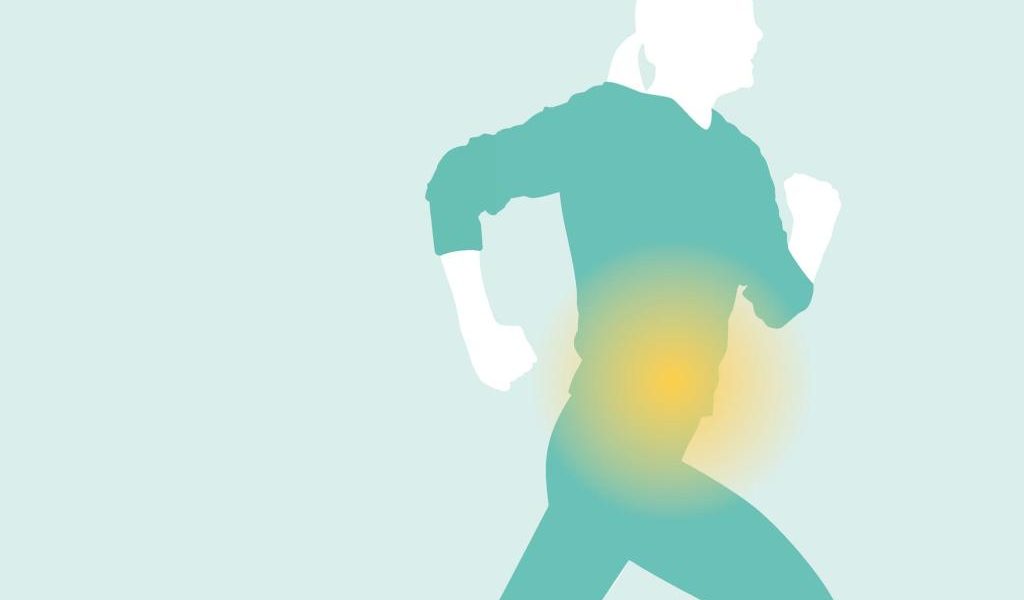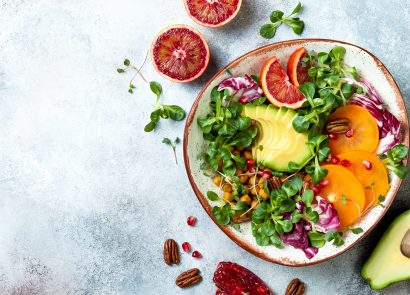It may sound strange, but keeping your gut bacteria happy can actually help you feel more positive, too. Here’s how…
Ever had an initial gut reaction to something, but dismissed it as nothing? It turns out that you should start paying more attention to those feelings. The gut isn’t known as the ‘second brain’ for no reason – in fact, it could be in charge of more decisions and feelings than you realise, including your cravings and mood. And, if your gut isn’t in its best condition, it can affect more than just your digestive system. So, how exactly is your brain connected to your gut, and how can you ensure that the link is a healthy one? We called in the experts to find out…
What is the gut?
It’s all well and good trying to maintain good gut health, but what actually is it? “The gut – that long, windy tube that’s housed within your abdominal walls – runs a good nine metres and harbours tens of trillions of gut microbiota [a community of microorganisms, including bacteria and fungi],” explains Dr Riccardo Di Cuffa, GP and founder of Your Doctor (your-doctor.co.uk). “The gut is a hot house for a huge network of highly functioning cells and bacteria that work symbiotically to help our bodies digest food, produce particular vitamins, send our brain important messages and keep our immune systems and general health in check. Each individual’s composition of the gut microbiota is unique, and can weigh up to two kilograms!”
The second brain
“The brain controls and governs our digestive system,” says Dr Meg Arroll, health psychologist and author of IBS: Navigating your way to recovery (hammersmithbooks. co.uk). “However, it’s not only the brain that plays a part in the workings of our guts. The gut and the brain have two-way connections between them and communicate bidirectionally, like a telephone. The links are made via neurotransmitters, which release chemicals that transmit nerve signals across the central nervous system. When we talk about the gut-brain connection, we often call the actual brain ‘the big brain’, and the enteric nervous system located in the gut ‘the small brain’. This brain-gut-axis is involved in keeping balance and stability in the digestive system, appetite and weight control. The big brain is, of course, the most important organ in these processes, but we are beginning to learn more about how the microbiome also have an important role to play, not just in gut health, but in our overall health and wellbeing.”
The gut and mental health
“When we think of improving our mental health, we automatically direct our attentions to things like meditation, sleep and worklife balance, but one key ingredient we often don’t address is the impact our gut has on our mental health and wellbeing,” say the experts at Fresh Fitness Food (freshfitnessfood.com). It’s something that we should all be looking at, though, thanks to the gut-brain connection, as it can have such an impact. “Mental stress, for example, alters the environment of our guts in favour of pathogenic microbes, and makes our gut lining more permeable to pathogens and reduces mucus production,” the Fresh Fitness Foods experts add. “What’s more, gut diseases linked to dysbosis [an imbalance] of our microbiome, such as IBS and Crohn’s disease, have been proven to increase the risk of mental illnesses, such as depression and anxiety. Microbes also communicate with our brains by producing the same neurotransmitters that the brain uses – serotonin and dopamine, in simple terms, the hormones that make you feel happy. This is how your microbes can affect your mood and partially explains why food makes us feel good!”
Irritable bowel syndrome
“IBS is the most common condition to affect the gut, with at least one in three people experiencing symptoms at some point during their lives,” says Healthspan medical director Dr Sarah Brewer (healthspan.co.uk). “This condition is associated with symptoms of intermittent pain, bloating and a change in bowel habits. Growing evidence shows that digestive microflora play a role in the management of stress and anxiety, as bowel bacteria secrete substances that can have effects on the brain. The right balance of gut bacteria is important for stimulating serotonin production, which is why IBS is now considered a disturbance of brain-gut interactions.” In fact, research clearly shows a relationship between trauma (fear) and disruption in the healthy workings of the gut, as Dr Arroll explains. “A study of 816 men and women with IBS found that those who had experienced the horrors of war at a very early age were indeed more likely to have IBS in later life. For patients with this condition, gut-directed hypnotherapy is one of the most effective treatments. This tailored form of hypnotherapy eases symptoms such as diarrhoea, constipation, urgency and pain through techniques such as guided imagery and relaxation.”
How to support your gut and mind
Eat more fibre
“We may not be able to digest fibre, but it’s what feeds your gut bacteria – which in turn, produce these beneficial compounds for you,” say the experts at Fresh Fitness Foods. “Most people will therefore benefit from an increase in fibre intake. The recommendation is 30g per day, but research suggests that in the UK we only get about two thirds of that. Fibre is found in plant foods only, so load up on vegetables and unrefined starch to increase your intake.”
Steer clear of late night snacks and drinks
“Eating late at night prevents your gut from regenerating, which contributes to bloating, gas and food intolerance,” says Dr Di Cuffa. “Give your gut a break to kill unwanted bad bacteria and help the natural regeneration needed for healing digestive problems, such as inflammatory bowel diseases and leaky gut.”
Have a varied diet
“It’s old advice, but its importance cannot be underestimated,” explains the Fresh Fitness Food experts. “A diverse community is a sign of a healthy gut and protects against a host of diseases, so it’s important to eat as many different plants as possible. Humans are habitual creatures, we tend to eat the same foods repeatedly, but it’s beneficial for our guts to be adventurous in order to introduce as many new bacteria strains as possible.”
Avoid antibiotics
“Antibiotics are indeed useful and often necessary when treating infections and other illnesses but, while they attempt to kill off the infection, they also often destroy the friendly gut bacteria that we need in our bodies,” says Dr Di Cuffa. “Steer clear of overusing antibiotics to keep your gut balanced and happy.”
Get enough sleep
“Sleep allows your gut to eliminate toxins which have accumulated throughout the day, returning inflammatory markers to normal levels and rejuvenating the gut for the next day’s nutritional onslaught,” explains Dr Di Cuffa. “Recent research suggests that fragmented sleep may trigger gut inflammation, leading to metabolism disruption, while better quality rest helps to reduce the risk of weight gain and diabetes and, improves your general metabolic health.”






















